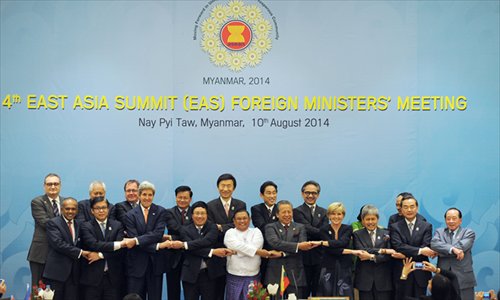HOME >> CHINA
FM snubs US push for sea moratorium
By Agencies – Global Times Source:Global Times Published: 2014-8-11 0:48:02
Respect region’s hard-won stability: China

Participants attending the 4th East Asia Summit Foreign Ministers' Meeting pose for a group photo prior to the meeting in Nay Pyi Taw on Sunday. Photo: AFP
China's foreign minister Wang Yi rebuffed Washington's proposal for a moratorium on "provocative actions" in the South China Sea over the past weekend.Wang made the remarks Saturday at a press conference after the China-ASEAN Foreign Ministers' Meeting on the sidelines of ASEAN meetings in Nay Pyi Taw, Myanmar.
Wang clarified China's "unshakable" position over the South China Sea issue.
While China is willing to listen to well-intentioned suggestions from all parties on the South China Sea issue, such suggestions must be objective, impartial and constructive, said Wang.
The US said it is pushing for an agreement to end all acts that risk further inflaming relations between Beijing and its Southeast Asian neighbors, following several tense encounters in the contested South China Sea this year, including a dispute over China's deployment of an oil rig that led to anti-China riots in Vietnam.
The Philippines has also called for a freeze as part of a three-step plan to ease tension in the resource-rich sea.
However, Wang told the press conference that suggestions designed to avoid further complication and escalation of the situation are somewhat unnecessary, as the Declaration on the Code of Conduct of Parties in the South China Sea (DOC) already contains clear provisions in this regard.
Meanwhile, suggestions aimed at "setting up a separate kitchen" and going a different way, or those leading to double standards will inevitably interfere with implementation of the DOC and consultations on a Code of Conduct (COC) and are unacceptable, he added.
In a separate meeting with Kerry on Saturday, the Chinese foreign minister also stressed that the overall situation in the South China Sea is stable, and there is no problem with freedom of navigation.
China hopes all parties cherish the hard-won stability of the region and play a constructive role, he said.
For his part, Kerry pledged that the US takes no sides on the South China Sea issue and hopes for peace and stability in the region.
However, Chinese observers have slammed Washington's moves surrounding the issue as "fanning the flames."
Ruan Zongze, a deputy director of the China Institute of International Studies, told the Global Times that the US is using the issue as an instrument to facilitate its pivot to Asia.
The final statement by ASEAN foreign ministers released on Sunday had reportedly been delayed as members wrangled over the language of the South China Sea section.
There was no specific mention of China in the statement, and the 10 nations did not take up the US and Philippine call for a freeze on provocative acts in the sea.
Reuters quoted an anonymous senior US official as saying that ASEAN countries' concern over China's maritime actions was at an "all-time high" based on private conversations, although their public statements were more guarded to avoid antagonizing China.
Wu Shicun, president of the National Institute for South China Sea Studies, told the Global Times that the wording in the ASEAN statement was expected, as the South China Sea issue is not the major issue in the China-ASEAN relationship, which is defined by cooperation.
"The US and several other countries' attempts to drive a wedge between China and ASEAN are unpopular among ASEAN countries," he said.
In order to chart a course to resolve the South China Sea issue, Wang underlined a "dual-track" approach, which indicates that relevant disputes should be addressed by countries directly concerned through friendly consultations and negotiation.
Posted in: Diplomacy